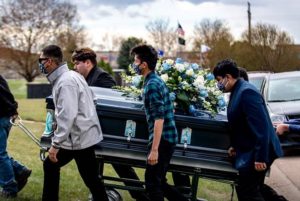Mother Jones: “The Workers Are Being Sacrificed”
As Cases Mounted, Meatpacker JBS Kept People on Crowded Factory Floors
May 1, 2020

With coronavirus outbreaks at two-thirds of the company’s beef processing plants, employees are asking, “Why didn’t they help protect us?”
For indispensable reporting on the coronavirus crisis and more, subscribe to Mother Jones’ newsletters.
On her phone, Crystal Rodriguez keeps a photo of her father hooked up to a ventilator. Nurses at the hospital sent her the image after he’d spent close to a month in the intensive care unit at UCHealth Medical Center of the Rockies in Loveland, Colorado, battling severe complications from COVID-19. At 58, he was unable to speak or visit with family. Rodriguez is convinced that her father was exposed to the coronavirus at work on the meatpacking line at JBS, a Brazilian-owned multinational that brings in $50 billion annually as the world’s largest meat processor. “They have so much money and so much knowledge of everything,” Rodriguez says. “Why didn’t they help protect us?”
A 33-year-old single mother of four, Rodriguez grew up in Greeley, Colorado, home to JBS’s American headquarters and a massive plant that employs 6,000 workers. Rodriguez has worked there, on and off, alongside her father since she was 18. In the photo on her company ID, she has thick black hair and a wide smile, but her happy expression belies the reality at work. She says JBS is like a bad ex-boyfriend who you keep trying to leave, “but you still go back for some reason.”
Every workday in Greeley, plant employees herd 5,000 cattle onto the kill floor, where more workers stun, bleed out, dehide, dehair, gut, and split the carcasses. The hanging halves are chilled and aged, before a line of still more workers, standing along a snaking conveyor system, butchers each into individual cuts for packaging. For eight hours each shift, Rodriguez stands elbow to elbow with a dozen other employees, pulling slabs of beef off a conveyor belt and swiftly trimming them into cuts of lean brisket. The work is taxing, and the repetitive, forceful motion takes a toll. Rodriguez says her hands tingle at night, and her fingers are curled and misshapen from holding a knife and hook all day. She calls them her “grandma hands.” MORE